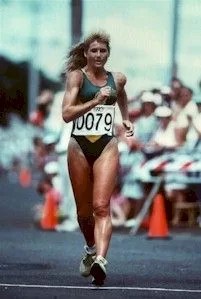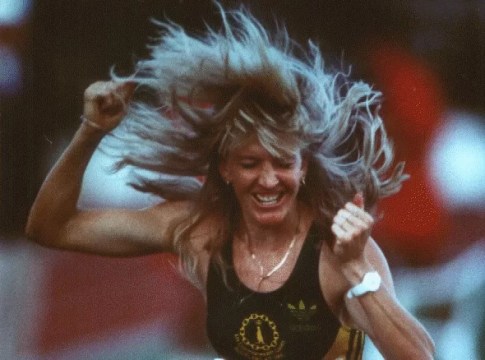Australia’s performance at the 1990 Auckland Commonwealth Games was a showcase of the country’s strength and depth in track and field athletics. From Darren Clark’s powerful sprints to Andrew Jachno’s gritty walk, and from Kerry-Anne Saxby’s dominance to the marathon excellence of Lisa Martin and Tani Ruckle, the Games were filled with memorable moments that highlighted the talent and determination of Australian athletes.
The successes in weightlifting, hammer throw, and the versatile achievements of Jane Flemming added to the nation’s pride, making the 1990 Commonwealth Games one of the most successful for Australia.
Advertisement:
Australia’s Track and Field at the 1990 Auckland Commonwealth Games

Darren Clark: The 400m Star
Darren Clark was one of Australia’s most promising athletes heading into the 1990 Auckland Commonwealth Games. Known for his blistering speed and strength, Darren Clark didn’t disappoint and he took home the gold medal for the 400m.
On January 28, 1990, he took to the track with determination and skill, delivering a powerful performance that saw him finish just shy of the podium in fourth place in the 200m.

Clark’s performance was commendable, and he continued to be a significant figure in Australian athletics, known for his competitive spirit and consistency.
Andrew Jachno: Walking to Silver
The men’s walking events were another area where Australia shone at the Auckland Games. Andrew Jachno was a standout performer in the Men’s 20km Walk on February 2, 1990.

Despite the grueling nature of the race, Jachno remained focused and determined, ultimately winning the silver medal.
The image of him grimacing upon completion of the race captured the sheer effort it took to achieve this result, reflecting the high physical and emotional demands of race walking at the elite level.
The Men’s 20km Walk also saw two other Australian competitors, Simon Baker and Paul Copeland, deliver commendable performances. Baker and Copeland crossed the finish line together, placing seventh with a time of 2:19.55 seconds.

Their decision to finish the race side by side was a powerful display of team unity and sportsmanship, highlighting the camaraderie that existed within the Australian walking team.
For Baker and Copeland, their finish was not just about individual placement but also about representing Australia with pride and unity.
Kerry-Anne Saxby: A Golden Walk

Kerry-Anne Saxby was one of Australia’s leading race walkers, and she delivered an unforgettable performance at the 1990 Auckland Commonwealth Games.

On February 2, 1990, Saxby competed in the Women’s 10km Walk, a race that she dominated from start to finish.
Crossing the line to take the gold medal, Saxby solidified her status as one of the best in the world in her discipline.
Standing on the dais alongside New Zealand’s silver medallist Anne Judkins and England’s bronze medallist Lisa Langford, the medal presentation ceremony was a proud moment for Saxby and Australia.
Lisa Martin and Tani Ruckle: Marathon Excellence

The women’s marathon at the Auckland Games was a showcase of Australian endurance and determination.

Lisa Martin was already an established marathon runner with a history of success in international competitions.
Martin added to her impressive résumé by winning the gold medal in the Women’s Marathon.
Her victory was celebrated by Hazel Hawke, the wife of then-Australian Prime Minister Bob Hawke, who presented Martin and Ruckles with their Commonwealth Games medal.

Martin’s triumph was part of a remarkable one-two finish for Australia, as Tani Ruckle crossed the line shortly after to claim the silver medal.
Steve Moneghetti: A Marathon Medal
Steve Moneghetti was one of Australia’s most respected long-distance runners, and his performance in the Men’s Marathon at the Auckland Games further solidified his reputation.
Moneghetti ran a strong and strategic race, finishing in second place to claim the silver medal.

Gold medallist Douglas Wakiihuri of Kenya, left, turns to shake the hand of Steve Moneghetti of Australia after winning the Silver Medal in the Men’s Marathon.
Moneghetti’s silver medal was a proud moment for Australia, and his performance was widely regarded as one of the best of his career.
Jason Roberts: A Triple Silver Medallist

In the weightlifting arena, Jason Roberts proved to be one of Australia’s most successful athletes at the Auckland Games.
Competing in the 110kg category, Roberts secured three silver medals in the Clean & Jerk, Combined, and Snatch competitions.
His joy was evident as he leaped and shouted after each successful lift, his enthusiasm reflecting the hard work and dedication he had put into his sport.
Roberts’s achievements added to Australia’s medal tally and highlighted the country’s strength in weightlifting, a discipline that requires both physical power and mental focus.
Sean Carlin: Hammer Throw Glory


Sean Carlin was one of Australia’s field event stars at the 1990 Commonwealth Games. On January 27, 1990, Carlin competed in the Hammer Throw, where he delivered a series of impressive throws that culminated in a gold medal-winning performance.
Carlin’s victory was a significant achievement for Australia, as it demonstrated the country’s prowess in the field events, which are often overshadowed by the more glamorous track competitions.
Carlin’s success was celebrated not just for the medal he won, but for the determination and skill he displayed throughout the competition. His performance was a highlight of the Games for the Australian team.
Jane Flemming: A Golden Double

Jane Flemming OAM was one of the most versatile and accomplished athletes for Australia at the 1990 Auckland Commonwealth Games, delivering exceptional performances in both the heptathlon and the long jump.
Flemming’s versatility and determination were on full display as she secured gold medals in both events, cementing her status as one of Australia’s greatest multi-event athletes.
In the heptathlon, Flemming dominated across all seven disciplines, showcasing her remarkable athletic ability and mental toughness.
Her victory in the long jump further highlighted her skill, making her one of the most celebrated athletes of the Games.
Flemming’s achievements in Auckland not only added to Australia’s impressive medal tally but also inspired a generation of young athletes to pursue excellence in track and field.
The women’s 4x100m relay was won by the Australian team, of Monique Dunstan, Kathy Sambell, Cathy Freeman, Kerry Johnson, who delivered a seamless performance, showcasing their speed and teamwork.

Debbie Flintoff-King, already an Olympian and Commonwealth gold medal winner, took home two silver medals in the 400m Hurdles and 4x400m Relay.
Andrew Lloyd of Australia providing one of the most dramatic moments of the Games. In the 5000m final, Lloyd produced a stunning sprint finish to win gold, narrowly edging out the favored African runners in a race that had the crowd on their feet.
Track Events at the 1990 Auckland Commonwealth Games
The 1990 Auckland Commonwealth Games were a spectacular showcase of athleticism, with the track events being some of the most eagerly anticipated competitions of the Games. Held at Mount Smart Stadium, the track events brought together the best athletes from across the Commonwealth, competing in a range of disciplines from sprints to long-distance races, hurdles, and relays.
The Sprints: A Battle for Speed
The sprints are always a highlight at any major athletics event, and the Auckland Commonwealth Games were no exception. The men’s and women’s 100m and 200m races were fiercely contested, with athletes from England, Canada, Australia, and the Caribbean nations vying for the top spots on the podium.
Linford Christie of England was one of the standout performers in the sprints. Already an established star, Christie entered the Games as the favorite for the men’s 100m, and he did not disappoint. In a thrilling final, Christie powered through the finish line to claim gold, reinforcing his status as one of the fastest men in the world. Christie scored his second gold in the 4x100m relay. His victory in Auckland was a precursor to his later successes, including his Olympic gold medal at the 1992 Barcelona Olympic Games.
The 200m races saw intense competition as well. In the men’s event, England owned the podium, Marcus Adam, first; John Regis, second; and Ade Mafe, third.
In the women’s sprints, Merlene Ottey of Jamaica emerged as a dominant force. Ottey, known for her explosive speed, won gold in the women’s 100m and 200m, adding to her impressive medal tally from previous international competitions.
Middle and Long-Distance Races: Endurance and Strategy
In the men’s 800m, Sammy Tirop of Kenya ran a brilliantly paced race to win gold, holding off strong competition from his rivals. Tirop’s victory was part of a long tradition of Kenyan excellence in middle-distance running.
The women’s 800m was won by Diane Edwards of England, who executed a well-timed race to secure the top spot. Edwards’ victory was a highlight for the English team, adding to their overall medal haul.
In the men’s 1500m race, Peter Elliott of England ran a tactically astute race, using his experience to outmaneuver his competitors and take gold. For the women, Angela Chalmers of Canada was the star, winning both the 1500m and the 3000m races, showcasing her remarkable versatility and stamina.
Hurdles and Relays: Precision and Teamwork
In the men’s 110m hurdles, Colin Jackson of Wales lived up to expectations, winning gold with a flawless performance. Jackson’s victory was one of the most anticipated of the Games, as he had already established himself as one of the top hurdlers in the world.
The women’s 100m hurdles saw Kay Morley of Wales claim gold, a highlight for the Welsh team, which had several strong performances throughout the Games.
The relay events, as always, were a thrilling conclusion to the track competitions. In the men’s 4x100m relay, England’s team, anchored by Linford Christie, won gold, adding to their medal tally and providing a fitting end to the sprint events.
In the longer 4x400m relays, the Kenyan men’s team took gold, while England’s women’s team triumphed in their race, with both events providing a spectacular display of endurance, speed, and coordination.
The Steeplechase and Marathon: Tests of Endurance
The steeplechase and marathon events at the Auckland Games were ultimate tests of endurance, with athletes pushing themselves to the limit over grueling distances.
In the men’s 3000m steeplechase, Julius Kariuki of Kenya took gold.
The marathon events were a true test of stamina and mental toughness. In the men’s marathon, Douglas Wakiihuri of Kenya claimed gold, continuing Kenya’s dominance in long-distance running. For the women, Lisa Martin of Australia won gold.
A Celebration of Athletic Excellence
The track events at the 1990 Auckland Commonwealth Games were a celebration of athletic excellence, bringing together the best runners, hurdlers, and relay teams from across the Commonwealth. The Games were marked by incredible performances, dramatic finishes, and moments of sportsmanship that embodied the spirit of the event.
Australian Athletics Gold Medal Winners
| Women – Monique Dunstan (4x100m relay) Jane Flemming (Long Jump, Heptathlon) Catherine Freeman (4x100m relay) Kerry Johnson (4x100m relay) Lisa Martin (Marathon) Kathy Sambell (4x100m relay) Kerry Saxby (10km walk) Lisa-Marie Vizaniari (Discus) | Men – Simon Arkell (Pole Vault) Sean Carlin (Hammer) Darren Clark (400m) Andrew Lloyd (5000m) |
Photos, Stories and Pages in this feature series:
The Ceremony | The Pool | The Track & Field | Jason Statham diving | The Green | The Range | The Ring | The Velodrome | The Picture Editor’s Desk
Advertisement:




